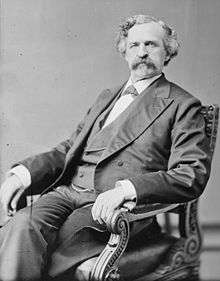John J. Patterson
| John James Patterson | |
|---|---|
 | |
| United States Senator from South Carolina | |
|
In office March 4, 1873 – March 3, 1879 | |
| Preceded by | Frederick A. Sawyer |
| Succeeded by | Wade Hampton III |
| Member of the Pennsylvania House of Representatives from Juniata and Union Counties | |
|
In office January 4, 1859 – January 1, 1861 | |
| Preceded by | Thomas Bower |
| Succeeded by | George W. Strouse |
| Personal details | |
| Born |
August 8, 1830 Waterloo, Juniata County, Pennsylvania |
| Died |
September 28, 1912 (aged 82) Mifflintown, Pennsylvania |
| Political party | Republican |
| Military service | |
| Allegiance | United States of America |
| Service/branch | United States Army |
| Years of service | 1861–1865 |
| Rank | Captain |
| Unit | Fifteenth U.S. (Regular) Infantry |
| Battles/wars | American Civil War |
John James Patterson (August 8, 1830 – September 28, 1912) was a businessman and United States Senator from South Carolina.
Biography
Born in Waterloo, a populated place in Juniata County, Pennsylvania, he grew up there and attended the public schools, and then attended Jefferson College in Canonsburg. During the 1850s he engaged in newspaper and banking businesses in Pennsylvania; he was publisher of the Juniata Sentinel in 1852 and in 1853 became editor and part owner of the Harrisburg Telegraph in Harrisburg, the state capital. He first entered politics in 1859 when he was elected to the Pennsylvania House of Representatives, in which he served until 1861.
In 1861, when the Civil War began, he joined the United States Army and served as a captain in the Fifteenth U.S. (regular) Infantry. Meanwhile, he ran for a seat in the United States House of Representatives in 1862, but was unsuccessful.
After the war Patterson moved to Columbia, South Carolina and engaged in railroad construction. He again entered politics and in 1873 was elected by the South Carolina Legislature to the U.S. Senate as a Republican. He was criticized by many in South Carolina for being a carpetbagger.[lower-alpha 1] Patterson was the chairman of the Committee on Education and Labor from 1875 to 1877 and a member of the committee on territories from 1877 to 1879. By the time his term ended in 1879, Reconstruction had ended and the Democrats had taken nearly all power in South Carolina, so Patterson had no hope of reelection.[lower-alpha 1] He continued to live in Washington, D.C., after leaving the Senate and engaged in financial enterprises.
In 1886 he moved to Mifflintown, Pennsylvania where he lived until his death. He continued to be active in business, particularly in running a company that installed electric lightbulbs.
He died on September 28, 1912. He is buried in the Westminster Presbyterian Cemetery.
Notes
- 1 2 According to one history of South Carolina published in 1920, concerning the 1872–74 term of Governor Franklin J. Moses, Jr., "the story is fairly well authenticated that John J. Patterson … in the midst of the Moses carnival of crime, boasted that 'there are still five years of good stealing in South Carolina'." The authors asserted that "Patterson controlled the most money and bought his way into [the Senate]" and that someone later testified he had stated it "cost him more than $40,000".[1]
References
- ↑ Snowden, Yates; Cutler, Harry Gardner (1920). "History of South Carolina". Chicago: The Lewis Publishing Company. pp. 913, 915. Retrieved December 9, 2014.
External links
- United States Congress. "John J. Patterson (id: P000123)". Biographical Directory of the United States Congress.
- The Political Graveyard
- Works by or about John J. Patterson in libraries (WorldCat catalog)
| United States Senate | ||
|---|---|---|
| Preceded by Frederick A. Sawyer |
U.S. Senator (Class 3) from South Carolina March 4, 1873 – March 3, 1879 Served alongside: Thomas J. Robertson, Matthew Butler |
Succeeded by Wade Hampton, III |
